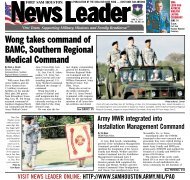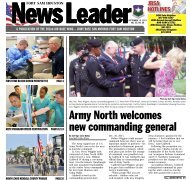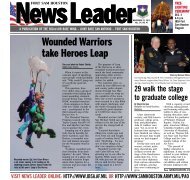Aug. 9 - Fort Sam Houston - U.S. Army
Aug. 9 - Fort Sam Houston - U.S. Army
Aug. 9 - Fort Sam Houston - U.S. Army
You also want an ePaper? Increase the reach of your titles
YUMPU automatically turns print PDFs into web optimized ePapers that Google loves.
AUGUST 9, 2012 NEWS LEADER PAGE 9ARNORTH, from P4assignment and sends itto the defense coordinatingofficer,” said Lt. Col.Charles Jackson, deputydefense coordinating officerfor U.S. <strong>Army</strong> North’sDefense CoordinatingElement Region VII out ofKansas City, Mo.“The DCO will alert<strong>Army</strong> North of the helprequest, and then the defensecoordinating elementwill be activated,” Jacksonsaid. “Once they have arrivedon the scene, theywill monitor situationalawareness and determineif there are any militaryimmediate responders onthe scene.“We are always thesupport element when werespond to situations inthe United States,” Jacksonadded.Defense coordinatingelements serve as theDOD’s first responders toa natural or manmadedisaster. The DCEs arepermanently assigned toall 10 FEMA regions andserve as the DOD’s pointof contact to the primaryfederal agencies respondingto an event.“We are the bridgebetween the state andfederal government incoordinating resources toprovide assistance to theAmerican public,” said Sgt.1st Class James Venable,emergency preparednessliaison officer for DefenseCoordinating Element VII.After a disaster, stategovernments turn toFEMA to request help inproviding resources tothose affected. If FEMAcannot provide the neededresources directly, it sendsa mission assignment tothe assigned DCE requestinghelp.Timeliness is paramountonce called upon. Theprocess is a quick one andthe mission is vital – toaid their fellow Americanswhen called upon.“When we get a missionassignment from FEMA,the first thing we do isdetermine if it meets regulatorycriteria,” Jacksonsaid. “If it does, the DCEworks to get the missionassigned.”Mission assignments fallunder three categories:lifesaving, life-sustainingand all others. Once themission assignment is approved,it is sent to a jointtask force to be carriedout.To ensure the DCE is effectivein times of nationalemergency, it is certifiedannually. DCE VII is currentlyat Camp Atterbury,Ind., and is undergoingcertification as part ofVibrant Response 13.When the membersof DCE VII arrived onthe scene, they workedon gaining situationalawareness and to kickoffthe process of approvingmission assignments thatwould ultimately go toJoint Task Force-Guardian,a command and controlresponse element composedof National Guardmembers.“One of the most difficultthings in the initialhours after an incident isdetermining real informationand separating it frominaccurate information,”Jackson said. “That’s whyit is important that weremain in contact withthe responders on theground.”“This training is importantbecause it preparesus to understand whatis required in a realworldincident,” said Col.Edward Manning, defensecoordinating officer, DCERegion VII.SCHOOL, from P2Tech. Sgt. Travis Yates,Randolph ground safetyNCO in charge.“This helps the parentsdetermine the safestroute and the travel timeit will take their child toget home; also by layingout the route, parents canlocate all street crossingsand possible dangerareas.”Besides teaching theirkids how to travel safely,parents should ensure theyare safe while in class. Ina classroom of 20 or morekids and only one teacher,accidents can easily happen.It is vital parents teachtheir kids how to correctlyhandle sharp objects, glueand other toxic materials.The way parents goabout starting the schoolyear has a big impact onhow smooth the transitionfrom a summer to schoolmindset plays out.“Anyone with childrenknows the start of a newschool year is stressful,”Yates said.“Buying clothes, gettingschool supplies, immunizationsand everything elsewill push parents to theedge of sanity, but properplanning and preparationcan greatly reduce thestress on everyone.”
















